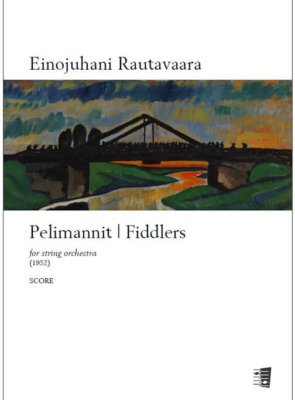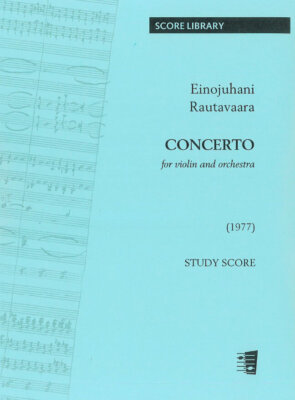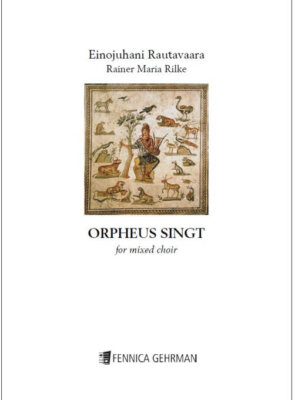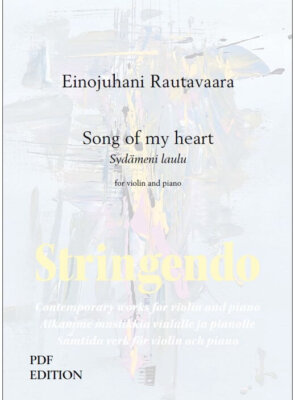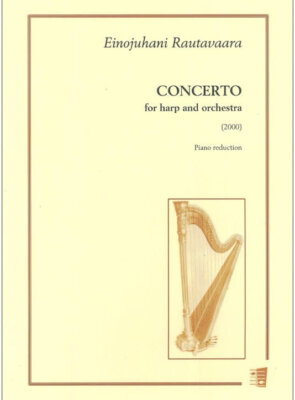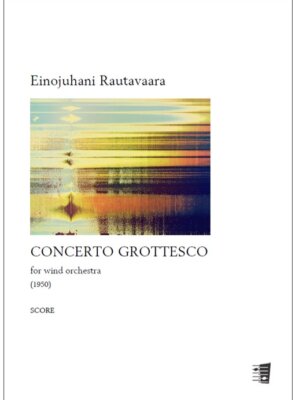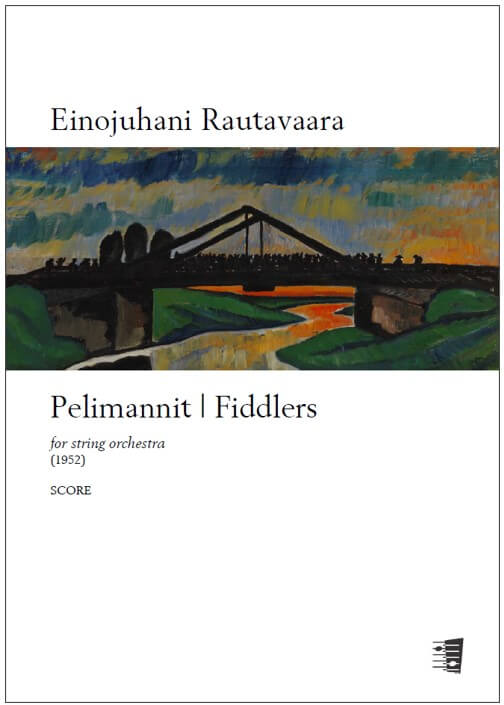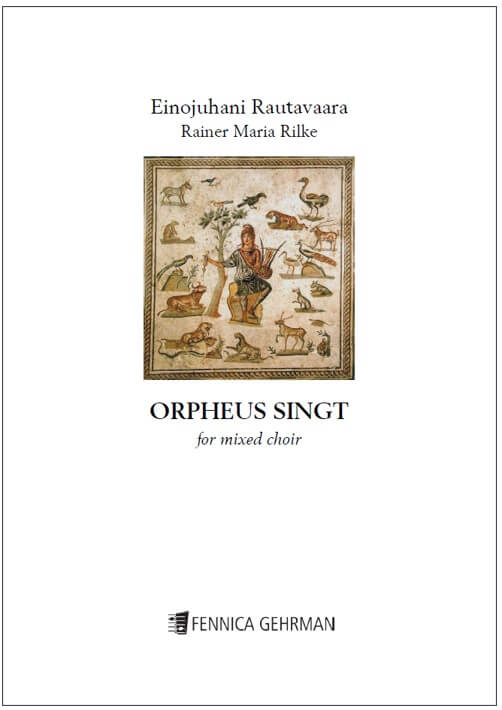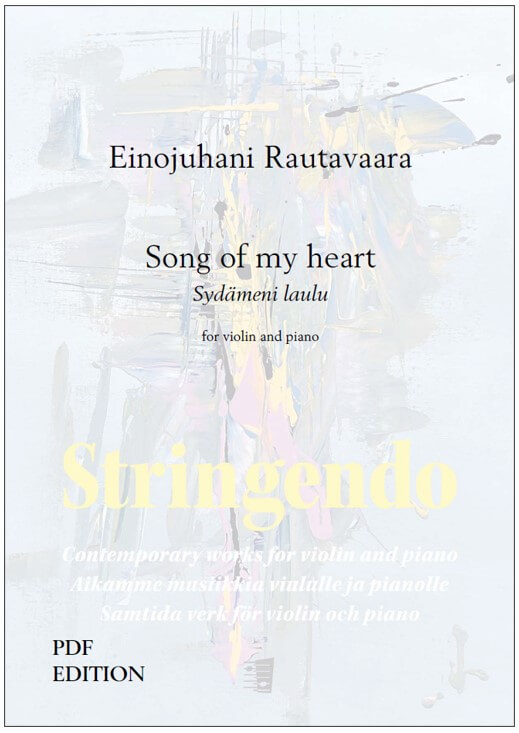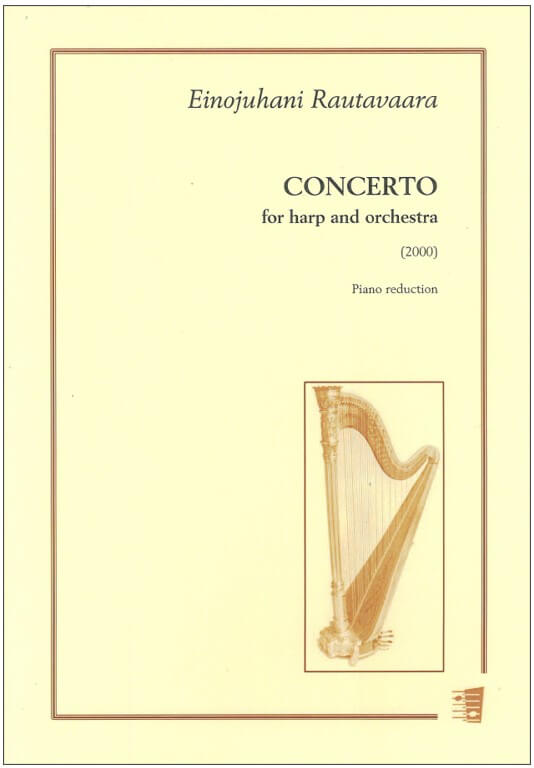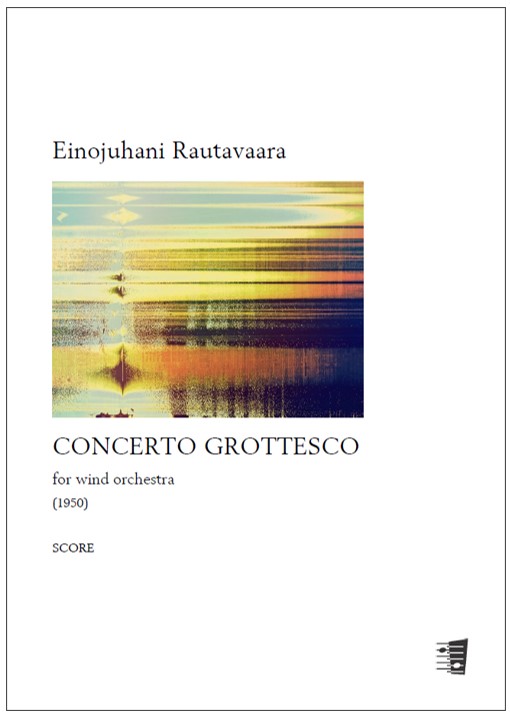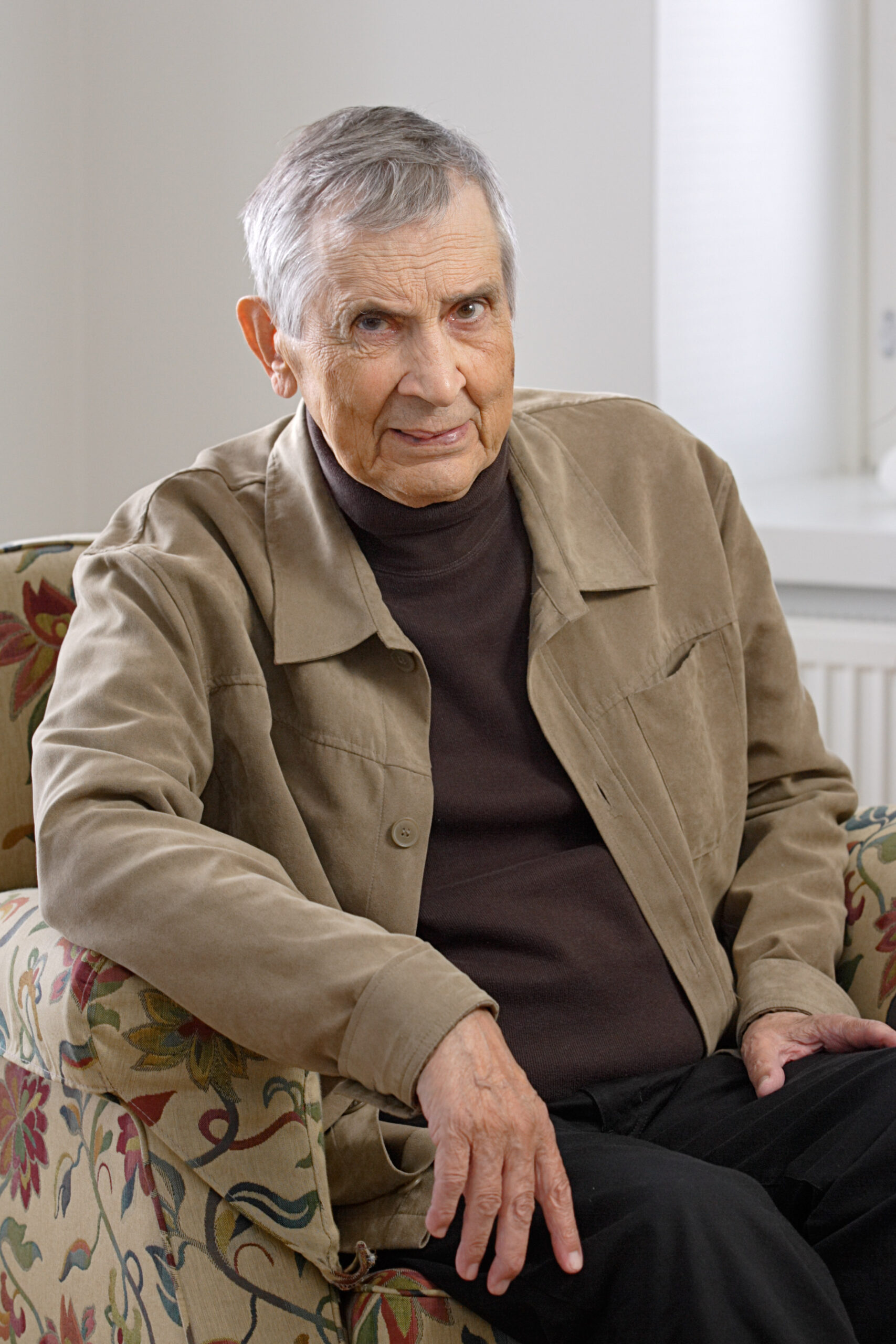
Rautavaara, Einojuhani
Einojuhani Rautavaara (9. October 1928 – 27. July 2016) is internationally one of the best known and most frequently performed Finnish composers. He was by nature a romantic, even a mystic, as is often apparent from the titles of his works: for example Angels and Visitations for orchestra or his double-bass concerto Angel of Dusk. Despite Rautavaara’s label of “mysticism” he was a complex and contradictory figure whose works cannot be categorized in stylistic terms.
At the age of seventeen Rautavaara began studying the piano and later went on to study musicology at Helsinki University and composition at the Sibelius Academy. From 1951-53 he was a pupil of Aarre Merikanto receiving his diploma in composition in 1957. In 1955 the Koussewitzky Foundation awarded Jean Sibelius a scholarship in honour of his 90th birthday to enable a young Finnish composer of his choice to study in the United States. Sibelius selected Rautavaara who spent two years studying with Vincent Persichetti at the Juilliard School of Music in New York and also took part in the summer courses at Tanglewood given by Roger Sessions and Aaron Copland. In 1957 Rautavaara continued his studies with Wladimir Vogel in Ascona, Switzerland and a year later with Rudolf Petzold in Cologne. Rautavaara has taught and lectured at the Sibelius Academy as the professor of composition. Since 1988 he made his living as a composer in Helsinki.
Rautavaara’s earliest works revealed close ties to tradition but also his desire to renew it. They were followed by an extreme constructivist and avant-garde phase (as in the serially organized fourth symphony “Arabescata”, 1962) after which Rautavaara turned to hyper-romanticism and finally mysticism. Since the early 1980s Rautavaara has adopted a sort of post-modern musical language in which modern and traditional elements of varying degrees of constructivism or freedom are combined with one another.
Rautavaara composed eight symphonies, the most frequently performed of them being the Angel of Light, his seventh symphony. Symphony No. 8 “The Journey” was premiered in April 2000 by the Philadelphia Orchestra under Wolfgang Sawallisch. Other important groups of works include concertos for different solo instruments, among them the three piano concertos, the popular Violin Concerto (1977), the Harp Concerto (2000) and the Clarinet Concerto (2001-02). Rautavaara has also written a large body of chamber music as well as choral and vocal works including All-Night Vigil for a cappella chorus. Rautavaara’s most popular orchestral work is Cantus arcticus, concerto for birds and orchestra, in which the orchestral part is juxtaposed with the sounds of birds recorded by the composer himself.
Apart from his symphonies the central pillars of Rautavaara’s extensive oeuvre are his operas. With Vincent (1985-87) and The House of the Sun (1990) Rautavaara has scored a notable international success. Aleksis Kivi was premiered at the Savonlinna Opera Festival in 1997 and it has been performed in Cosenza, Italy and Minneapolis, U.S.A since then. The Gift of the Magi (Tietäjien lahja) is a charming opera based on the short story by O. Henry. The last stage work Rautavaara wrote is Rasputin (2001-2003), an opera about the life of mystic and healer Grigory Rasputin. The libretto has been translated into German, and after the Finnish premiere the opera was also performed at the Lybeck Theatre in Germany.
A Soldier's Mass
Sotilasmessu (1968)
for wind orchestra
2232-asax-tsax-barsax-444(III&IV=btrb)2(I=barhn)-12 Percussione 1: Tamburo piccolo, Piatto sospeso, Silofono, Vibrafono 2: Tamburo militare, 2 Tom-toms, Tamtam, Campanelli, Legno
Duration: 11
Adagio celeste [SALES MATERIAL]
(2000)
for string orchestra
str
Duration: 6
Aleksis Kivi [complete opera]
(1995-96)
Opera in three acts
Soloists: 11 singing roles, 2 speaking roles 002(II=bcl)0-0000-02-synth-str Percussione: Timpano 25", Snare drum, 4 tom-tom, Piatto, Piatto sul timpano, Tamtam, Crotales, Marimba, Silofono, Vibrafono, Tubular bells, Legno, Frusta, Guiro, Flexaton
Duration: 105
Anadyomene
Adoration of Aphrodite (1968)
for orchestra
3(III=picc)33(III=bcl)3(III+cfg)-4441-10-hp-str
Duration: 11
Angel of Dusk [chamber version] [SALES MATERIAL]
(1980/93)
for double bass, two pianos and percussion
Duration: 27
Angel of Dusk [version for orchestra]
Concerto for Double Bass and Orchestra (1980/93)
2(II+picc)222-4331-13-hp.cel-str Percussion: Vibraphone, Marimba, Xylophone, Tubular bells, Tam-tam, Snare drum, Suspended Cymbal, Bass drum, Flexaton, Legno, 2 Woodblocks, Tom-tom, Glockenspiel
Duration: 27
Angels and Visitations
(1978)
for orchestra
33(III+ca)3(III+bcl)3(III+cfg)-4441-4Wagnertb-13-hp-cel-str
Duration: 20
Annunciations
Concerto for organ, brass group and symphonic wind (1976)
228(VII=ebcl;VIII=bcl)2-asax-tsax-33(III=picctr)31-euph-04-cb(4) Brass concertino: 1211
Duration: 30
Apotheosis
(1992 rev 1999)
for orchestra
223(III=bcl)3(III=cfg)-4421-13-hp-str Percussione: Tamtam, Marimba, Vibrafono
Duration: 8
Auringon talo / The House of the Sun
Das Sonnenhaus [complete opera] (1990)
Chamber Opera in Two Acts
Soloists: 10 singing roles 1111-2210-02-synth-str Percussion: Timpani (2), Side drum (w/ snare), 5 Tom-toms (also w/ brush), Cuica, Suspended cymbal, Cymbal on timpani, Tamtam (also w/ bow), Marimba, Vibraphone (w/ motor), Wood block, Whip, Guiro, Ratchet
Duration: 100
Autumn Gardens
(1999)
for orchestra
2222-2000-11-str Percussion: Timpani, 4 Tom-toms, Tamtam, Glockenspiel, Xylophone, Vibraphone, Tubular bells I Poetico (11') II Tranquillo (6') III Giocoso e leggiero (11')
Duration: 28
Ballad for Harp and Strings [SALES MATERIAL]
(1973/81)
hp-str also available as string quintet version
Duration: 10
Before the Icons
(1955 orch 2006)
for orchestra
33(III=ca)3(III=bcl)3(III=cfg)-4331-12-hp-str Perc: Snare drum, 4 Tom-toms, Piatto sospeso, Tamtam, Vibrafono, Tubular bells
Duration: 21
Bird Gardens [Second version]
Hommage à Zoltán Kodály (1982)
for string orchestra
str(min.86442)
Duration: 15
Canto I
(1960)
for string orchestra
str
Duration: 6
Canto II
(1960)
for string orchestra
str
Duration: 8
Canto III
A Portrait of the Artist at a Certain Moment (1972)
for string orchestra
str (min. 44442)
Duration: 9
Canto IV
(1992)
for string orchestra
str
Duration: 17
Cantus arcticus (Revised edition 2024)
Concerto for birds and orchestra (1972)
for orchestra with tape
2222-2210-11-cel-hp-str +sound file Percussion: Piatti, Tam-tam I Suo / The Bog 6' II Melankolia / Melancholy 4' III Joutsenet muuttavat / Swans migrating 7'
Duration: 17
Concerto for Clarinet and Orchestra
(2001-02)
222(II=bcl)2(II=cfg)-4221-12-hp-str Perc: 4 Tom-toms, Bass drum, Tamtam, Marimba, Vibraphone, Tubular bells
Duration: 26
Concerto for Harp and Orchestra
(2000)
2222-4220-12-2hp-str Percussione: Tom-tom, Gran cassa, Vibrafono, Campane, Flexaton
Duration: 23
Concerto for Violin and Orchestra
(1977)
2222-4330-13-hp-cel-str Perc: Tubular bells, tam-tam, silofono, marimba, tom-tom, Glockenspiel, gran cassa, castagnette, cabaca, sleigh bells, blocks, whip
Duration: 27
Concerto grottesco [SALES MATERIAL]
(1950)
for wind orchestra
2222-2211-11-2cb Percussion: Snare drum, Suspended cymbal, Triangle, Wood block 1. Fughetta (1'15) 2. Träumerei (2') 3. Scherzo (1'15) 4. Alla marcia (1')
Duration: 6
Concerto No. 2 for Piano and Orchestra
(1989)
112(II=bcl)2(II=cfg)-4300-12-str
Duration: 22
Concerto No. 3 for Piano and Orchestra
Gift of Dreams (1998)
2222-4220-13-str Percussion: Snare drum, 4 Tom-toms, Bass drum, Tamtam (large), Gong (about 30'), Xylophone, Vibraphone, Tubular bells
Duration: 27
Die Liebenden
Version for string orchestra (1958-59)
for soprano and string orchestra
str 1. Liebes-Lied 2. Der Schauende 3. Die Liebende 4. Der Tod der Geliebten
Duration: 16
Die Liebenden [SALES MATERIAL]
Version for string quintet
for soprano and string quintet
2vl-vla-vc-cb
Duration: 16
Dithyrambos
(1970)
for violin and orchestra
2022-2200-11-str
Duration: 5
Epitaph for Béla Bartók
(1955-56)
for string orchestra
str
Duration: 6
Eron hetki on kalveakasvo
Charlottas's Monologue from the opera Aleksis Kivi (1997)
opera excerpt for female voice and orchestra
002(II=cl.b)0-0000-01-str percussione: Vibraphone
Duration: 6
Finnish Myth [SALES MATERIAL], A
Suomalainen myytti (1977)
for string orchestra
str
Duration: 7
Four songs from the opera "Rasputin"
Neljä laulua oopperasta "Rasputin"
for mixed choir and orchestra
3(III=picc)3(III=ca)3(III=bcl)3(III=cfg)-4331-14-2hp-str Percussione: Snare drum, 4 Tom-toms, Tam-tam, Vibraphone, Tubular bells, Musical saw, Frusta, Flexaton, Lions roar, Cuica 1. Troikka kiitää (1'30) 2. Koston aika (2'30) 3. En pelkää nyt (2'30) 4. Loista, Siion, loista! (3'30)
Duration: 10
Four Songs from the opera Aleksis Kivi
Neljä laulua oopperasta Aleksis Kivi (1997)
for baritone and orchestra
002(II=bcl)0-0000-02-synth(DX7 ad lib. - only in movement 3)-str 1. Ikävyys (4') 2. Laulu oravasta (4') 3. Oi mailma, elämä sä ihmeellinen (5') 4. Sydämeni laulu (5')
Duration: 18
Fünf Sonette an Orpheus
(1956)
for soprano and orchestra
2222-2220-10-hp-str 1. Da stieg ein Baum 2. Und fast ein Mädchen wars 3. Ein Gott vermags 4. O ihr zärtlichen 5. Errichtet keinen Denkstein Soloist range b - G2. Available also half step lower (a# - F#2).
Duration: 15
Garden of Spaces
Regular Sets of Elements in Semiregular Situations (1971)
for orchestra
3000-3100-02-pf-str(min.44040) Percussione: 4 Timpani, 4 Tom-toms, Piatto sospeso, Tamtam, Glockenspiel
Duration: 12
Guds väg [SALES MATERIAL]
(1964/2003)
for voice and string orchestra
str 1. Gud’s väg 2. Barnet 3. Pingst 4. Dröm i katedralen
Duration: 7
Hommage à Liszt Ferenc
(1989)
for string orchestra
vl I, II, III, vc, db
Duration: 6
Ikävyys (Melancholy)
From Four Songs from the Opera Aleksis Kivi (1997)
for baritone and orchestra
002(II=cl.basso)0-0000-01(vibrafono)-str
Duration: 4
Iltarukous [SALES MATERIAL]
(1953/2002)
for voice and orchestra
str
Duration: 2
Isle of Bliss / Lintukoto
(1995)
for orchestra
2222-2110-11-hp-str Percussione: Vibrafono, Legno, Tamtam
Duration: 10
Kainuu [SALES MATERIAL]
(1975)
Cantata for speaker, mixed choir and percussion
Percussion: Timpani, Tamburo militare, Tom-tom, Bongos, Piatto, Vibrafono, Tubular bells, Woodblock, Guero
Duration: 37
Kaivos / The Mine [complete opera]
(1958)
Opera in three acts
3(I=picc).3(III=c.ing).3(III=cl.b).3(III=c.fag)-4(I-IV+wagner tuba).2.2.1-1.2-hp-cel-str, tape=alto sax, ten sax, 3 tr, trombone, bass, drums Solists: sopr solo, 2ten solo, 2baryt solo, 2basso solo, speaker, chx+chs Percussion: Snare drum, Triangle, Cymbals a2, Suspended cymbal, Gong, Tam-tam, Bass drum
Duration: 80
Kiusaukset / The Temptations / Les tentations
Allegorical Ballet in One Act (1969)
2222-4331-12-hp-cel-str
Duration: 30
Lapsimessu [SALES MATERIAL]
(1973)
for children’s chorus and strings
Score and parts available for sale (9790550118720)
Duration: 15
Laulu oravasta (The Squirrel)
From Four Songs from the Opera Aleksis Kivi (1997)
for baritone and orchestra
002(II=cl.basso)0-0000-str
Duration: 4
Marjatta matala neiti [SALES MATERIAL]
Suomalainen mysteeri (1977)
for SA chorus with 5 soloists and instrumental ensemble
fl-perc-org(or string quartet)
Duration: 25
Meren tytär
Konsertto sopraanolle, kuorolle ja orkesterille (1971)
for soprano solo, mixed choir and orchestra
3(III=picc)3(III=ca)3(III=bcl)3(III=cfg)-4331-12-hp-str Percussione: Tamburo militare, Side drum, Tenor drum, Gran cassa, Piatto, 2 Tamtams, Gong
Duration: 17
Modificata
(1957)
for orchestra
3(III=picc)3(III=ca)3(III=bcl)3(III=cfg)-4331-13-str Percussione: Side drum, 3 Tom-toms, Gran cassa, Piatto sospeso, 3 Tamtams, Marimba, Silofono, Vibrafono, Triangolo, Castagnetti, Woodblock, Maracas
Duration: 13
Nikolain monologi / The Monologue of Tsar Nicholas
from the opera Rasputin (2001-03)
opera excerpt for bass and orchestra
0033-4331-02-2hp-str
Duration: 5
Octet for Winds
(1962)
1111-211(=btrb)0
Duration: 15
Violin Concerto (II Energico)
BIS CD 1315 Lahti Symphony Orchestra, cond. Osmo Vänskä, sol. Jaakko Kuusisto
(BIS Records CD-1315)
Symphony No. 1 (I Andante)
National Orchestra of Belgium, cond. Mikko Franck
(Ondine Records CD-1064-5)
Symphony 7 Angel of Light (I Tranquillo)
Helsinki Philharmonic Orchestra, cond. Leif Segerstam
(Ondine Records CD- 869-2)
Cantus arcticus, Concerto for Birds and Orchestra (I The Bog)
Helsinki Philharmonic Orchestra, cond. Leif Segerstam
(Ondine Records CD-1041-2)
All-Night Vigil (Vigilia) (Final Blessing)
Finnish Radio Chamber Choir, cond. Timo Nuoranne
(Ondine Records CD-910-2)
Adagio celeste for string orchestra
Angel of Light (Symphony No. 7)
Angels and Visitations
Apotheosis
A Requiem in Our Time (Standard version)
A Requiem in Our Time (Original version)
Autumn Gardens
Before the Icons
Cantus arcticus
Isle of Bliss (Lintukoto)
On the Last Frontier
Piano Concerto No. 3 “Gift of Dreams
Symphony No. 3
Symphony No. 6 “Vincentiana”
Symphony No. 8 “The Journey”
Violin Concerto


